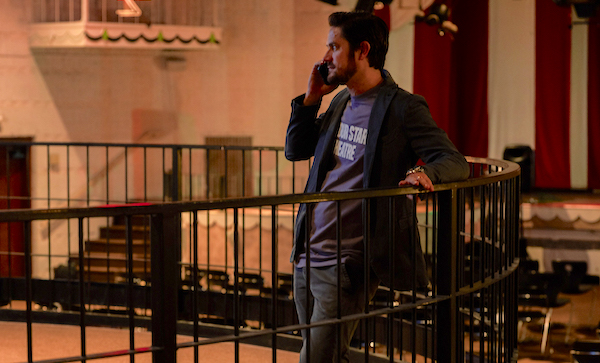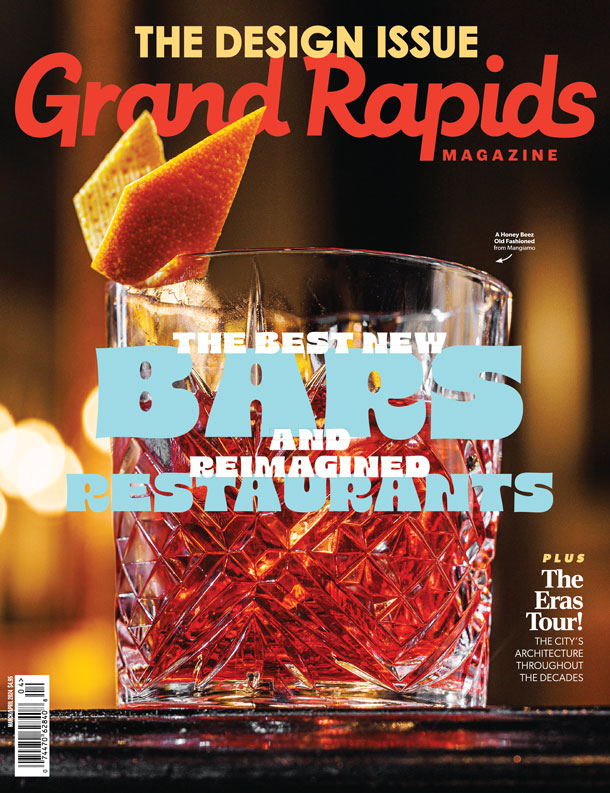Since the mid-1990s, the Four Star Theatre largely has sat empty.
But a new life is emerging for the historic theater building, 1944 S. Division Ave. Marcus Ringnalda is hoping to take the blueprints from theaters across the country — including one right here in Grand Rapids, the Wealthy Theatre — to create a community gathering space.
Opened as a 925-seat, single-screen theater in 1939, the Four Star Theatre was a gathering space for the neighborhood for nearly 60 years; first as the theater, then as a music venue and finally as a nightclub.
Now, after nearly five years of work, it’s ready for events. Earlier this year, the Grand Rapids Planning Commission approved the building for a limited capacity and Ringnalda hopes to eventually host hundreds of events a year in the building, ranging from concerts to movie nights to local art shows.
Ringnalda first toured the building in 2014, while he was working with a construction company. He was walking the theater with a local pastor and architect, hoping to create a worship space.
“My first impression was it could be a church on Sunday, and so much more,” Ringnalda said. “That was the feeling walking in, the bones are good — and they were excellent. But long story short, that project never came to fruition. I wasn’t going to be the general contractor, so it was like the one that got away.”
He kept tabs on the building and ended up buying it the day it went on the market in 2017.
“I bought the building without a plan other than I love the old building,” he said. “I had practical goals from the start, to see that marquee lit up again and an old iconic building restored. But in 2017, I had no idea of what a successful operation would look like.”
He began to leverage the nationwide network of the theaters, including Wealthy Theatre, which Ringnalda said is a strong model of how a healthy theater anchor could help revitalize a neighborhood.
“Whether small towns or big cities, a lot of these buildings fell into disrepair, neglected and not used,” he said. “All signs point to (a) nonprofit is generally how you make it work.”
At the same time, he was beginning to establish the roots of the nonprofit organization. He took part in a robust planning initiative by the city for the area the theater calls home, the South Division Area Specific Plan. The process identified a great need for community use, nicely aligned with the plans starting to develop for the theater.
Its historical presence as a place for gatherings was perfect for Ringnalda. He said after the original theater closed in 1969, it became the Great Northern Music Hall. Ringnalda said artists like Joan Jett, Eddie Money and Flock of Seagulls came through.
“I’ve had a number of people in their 60s remember seeing concerts here, impressionable concerts,” he said.
By the mid-80s, however, the music venue was closed and three iterations of nightclubs (and a short stint as a youth center) used the structure before it closed in 1993.
Incredibly, despite most of the inspection stickers reading 1994, Ringnalda said most of the building was in fine shape.
“It wasn’t a tear-out-and-replace-everything project. It’s not that old and never vandalized,” he said. “So, we shifted gears from the big, huge renovation to get open, reactive and show people what we can do here.”
This summer, the organization moved on from the close friends and family round of fundraising and started hosting events and working to get the word out for grant applications and other forms of funds from city, county, state and federal organizations. Eventually, the hope is to raise $5 million to create a “world class space.”
“We can piecemeal it as the funds roll in,” he said. “We’re in this interesting spot that is so exciting because we can start planning, but we have so long to go to make the most impact. We want this to be a regional draw, if not statewide and national.
“That’s one part of helping the community we’re in, drawing visitors, because there haven’t been a lot of reasons to visit Burton Heights for decades and we see this as a catalyst to changing that.
“But what we’re trying to do is create a space that starts to define itself. We don’t’ want to say this is the plan for now and evermore. The mission is to get people through the doors and build a sustainable business that is making the most positive impact in the city.”








Facebook Comments